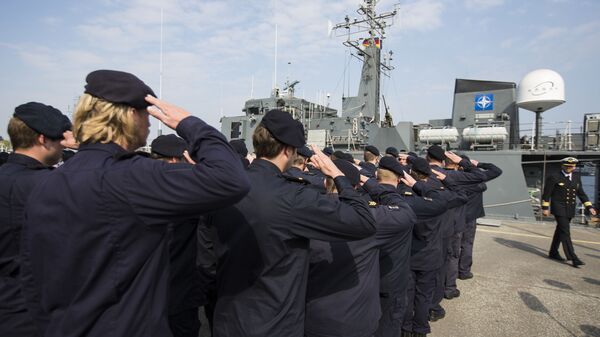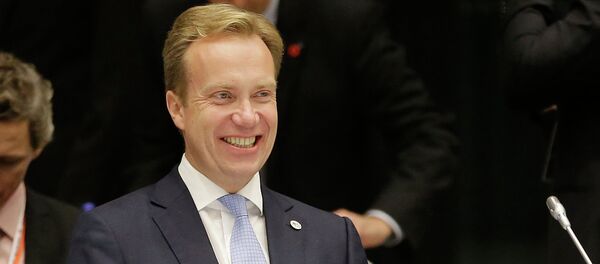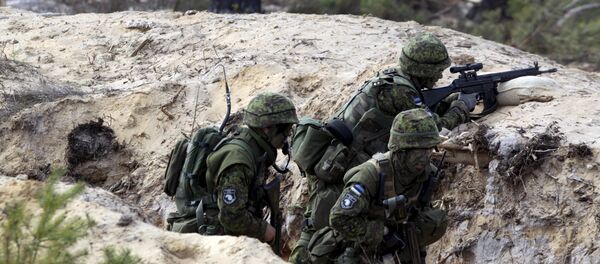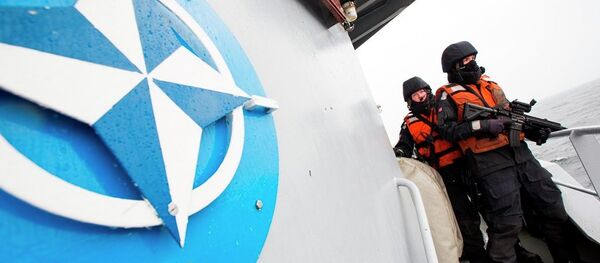The website fears that such a military policy in Norway, combined with its support of the anti-Russian sanctions, could "hardly be regarded as an invitation to a better neighborhood relationship with Russia." Many suggest, it says, that it could be a step not only towards a new Cold War, but towards a potential military confrontation with Russia, and even a nuclear weapon state.
Sputnik Radio discussed the issue with Russian military and political expert, retired colonel and columnist Viktor Baranets, who explained why Russia should closely monitor Norway's military plans.
"It could not but cause Russia's concerns as Norway is Russia's actual neighbor, where NATO has recently been fundamentally increasing its military buildup: they have an American command there, US marines, and radio detection and ranging equipment which is located in full view of Russia's naval base, as well as other NATO military facilities," he told Sputnik.
"Norway should be viewed as NATO's backyard, positioned to fortify the north flank of the Alliance. From an amicable neighbor it has virtually turned into a bear with American fangs," Baranets added.
The report of the Norwegian website was based an earlier analysis posted by the online journal Strategic Culture Foundation.
Earlier in July, defense and diplomatic analyst Alex Gorka wrote an article on the silent, "gradual but steady militarization of Scandinavia."
"The theme does not hit headlines and it is not the focus of public discourse, but one step is taken after another to turn the region into a springboard for the staging of offensive actions against Russia," the author said.
He referred to Orland air base in southern Norway, which is "being expanded to become Norway’s main air force base, hosting US-made F-35 Lightnings – the stealth aircraft set to become the backbone of Norwegian air power."
Norway has purchased 56 of these aircraft, he said.
"The F-35 is an offensive, not defensive, weapon. The nuclear capable platforms can strike deep into Russia’s territory," the author noted.
"The choice of the base was carefully calculated to keep the planes away from the reach of Russian Iskander missiles (500 kilometers) but no location in Norway is beyond the operational range of Kalibr ship-based sea-to-shore missiles and aircraft armed with long-range air-to-surface missiles," the author noted.
In June, Norway’s government announced that the decision was taken to extend the rotational US Marine Corps force stationed at Vaernes through 2018.
"The move contradicts the tried-and-true Norwegian policy of not deploying foreign military bases in the country in times of peace," he said.
Besides, the country is "to contribute to the NATO ballistic missile defense (BMD) system by integrating its Globus II/III radar on Vardoya Island, located near the Russian border, just a few kilometers from the home base of strategic submarines and 5 Aegis-equipped Fridtjof Nansen-class frigates."
The radar construction is underway. The Vardoya radar can distinguish real warheads from dummies. Another radar located in Svalbard (the Arctic) can also be used by the US military for missile defense purposes, Alex Gorka noted.
Also in June, the United States, United Kingdom and Norway agreed in principle to create a trilateral coalition built around the P-8 maritime aircraft to include joint operations in the North Atlantic near the Russian Northern Fleet bases.
Norway's neighbors Sweden and Finland have also been upgrading their military and have been taking part in large-scale military drills with the involvement of NATO forces.
"All these facts and events summed together demonstrate that the militarization of Scandinavia is progressing by leaps and bounds to undermine the security in Europe. No hue and cry is raised in the Russian media but the developments are closely watched by Moscow," the author said.
All the above can't but cause grave concerns, however Moscow "has never rejected the idea of launching talks to address the problem."
"…nothing is done to ease the tensions in Europe and the Scandinavian Peninsula in particular. Meanwhile, the situation is aggravating misunderstandings and whipping up tensions," Alex Gorka concluded.






